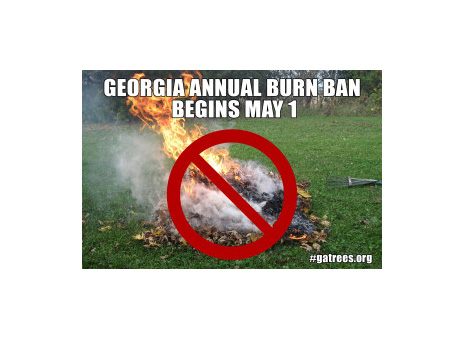
Do your summer activities impact the air you breathe? They can if you drive a car or do some outdoor burning! When particulate matter from vehicles and smoke gets trapped in hot air, it contributes to higher ozone levels, and that’s been linked to lung and heart disease in humans.
To help diminish air issues surrounding ozone pollutants, the Georgia Environmental Protection Division has instituted an outdoor burn ban every summer since 2005. While campfires, cooking fires, and some agriculture burns are permitted, 54 mostly north and central Georgia counties (listed below) do not allow yard and land debris clearing burns from May 1 to September 30. For complete details, visit https://epd.georgia.gov/air-protection-branch/open-burning-rules-georgia.
Georgia law classifies outdoor burning in several categories. In counties not included in the outdoor burn ban, the Georgia Forestry Commission reminds residents they must continue to follow specific laws, fire safety guidelines, and any local ordinances governing outdoor burning. The five safety precautions now mandated by law include set spacing between fires and woodlands and structures, burn times from sunrise to sunset, burner attendance at the fire, and reasonable precautions such as weather awareness and suppression tools. Full details including video resources can be found at https://gatrees.org/burn-permits-and-notifications/.
Georgia’s outdoor summer burn ban is in effect May 1-September 30 in the following counties: Banks, Barrow, Bartow, Bibb, Butts, Carroll, Catoosa, Chattooga, Cherokee, Clarke, Clayton, Cobb, Columbia, Coweta, Crawford, Dawson, DeKalb, Douglas, Fayette, Floyd, Forsyth, Fulton, Gordon, Gwinnett, Hall, Haralson, Heard, Henry, Houston, Jackson, Jasper, Jones, Lamar, Lumpkin, Madison, Meriwether, Monroe, Morgan, Newton, Oconee, Paulding, Peach, Pickens, Pike, Polk, Putnam, Richmond, Rockdale, Spalding, Troup, Twiggs, Upson, Walker, and Walton.
Georgia Forestry Commission


Bulloch Public Safety
06/12/2025 Booking Report for Bulloch County

Chattooga Schools
Small Towns Grow Big Ideas: A Scientist’s Journey from Chattooga to Duke

Chattooga Local News
Mr. Christopher “DJ” Chapman Obituary

Bulloch Public Safety
05/27/2025 Booking Report for Bulloch County

Bulloch Public Safety
06/09/2025 Booking Report for Bulloch County

Bulloch Public Safety
06/02/2025 Booking Report for Bulloch County

Bulloch Public Safety
05/19/2025 Booking Report for Bulloch County

Bulloch Public Safety
05/16/2025 Booking Report for Bulloch County







